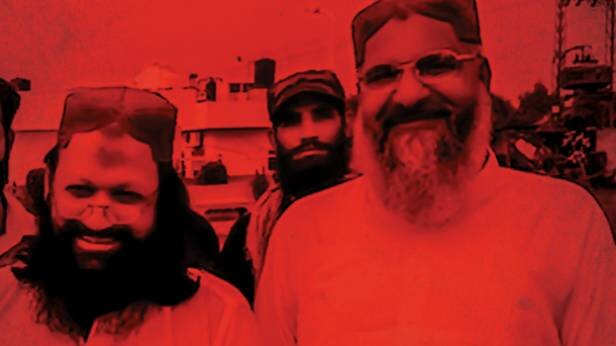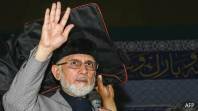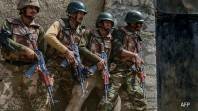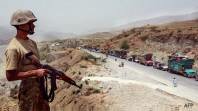It can only happen in Pakistan. A person who is not allowed to sit in a tea shop, lands in parliament to legislate. A man officially declared a terrorist roams around freely, meets people, addresses public gatherings, raises funds, contests elections and what is more, is declared a Member of the National Assembly (MNA) by the decree of an election tribunal, without having actually won a popular vote.
The head of a banned organization with known links to terrorists is declared to be an MNA by the tribunal over an appeal filed by just such a man against the person who won his seat in a general election. The tribunal holds that because Sheikh Muhammad Akram – who won his seat in a free and fair election – withheld information regarding a police report implicating him in a particular case, he must be stripped of his title as MNA for NA-89 Jhang and de-notified. In his place, the tribunal installs Mohammad Ahmed Ludhianvi, who is a Proclaimed Offender in the eyes of the law and could not even muster the popular support needed to become MNA.
Only in Pakistan are you allowed to challenge the results of a popular vote if you don’t like the outcome of the polls. The tribunals where such challenges are entertained not only accept the charges levelled by a sore loser, but also rule in his favour. The supporters of this man, upon hearing the news of his obviously engineered victory, dance to the beat of gunshots, indulge in illegal aerial firing and deliver charged speeches, inciting violence against other faiths, all in the name of democracy and justice.
It is hard to imagine that this is the same country where, on May 11, 2013, a democratically elected government handed over the reins of power to the party that had been sitting on the opposition benches for five long years.
The story of NA 89 is a peculiar one. Mohammad Ahmed Ludhianvi, a bonafide supporter of sectarian violence, tried with all his might to intimidate his way into the halls of power. He threatened all those who dared to run against him. Unfortunately for him, though, the people would not have it and instead, chose Sheikh Muhammad Akram as their representative in Islamabad.
If you think this is ironic, what would you say to the caretaker government, the Election Commission of Pakistan (ECP), and even the returning officer – who is supposed to have his hand on the pulse of the area, all of whom allowed a man with such a chequered past to not only contest the elections – but also to challenge the results of the very elections that had been termed ‘free and fair’ by the same government.
Ludhianvi is currently the head of the proscribed Ahle-Sunnat Wal Jamat (ASWJ), a new facade for the banned terrorist organization Sipah-e- Sahaba Pakistan (SSP), whose name is on the Fourth Schedule of the Anti Terrorism Act (ATA) 1997.
According to the ATA 1997, based on the information received from any source that a ‘person is an activist, office-bearer or an associate of an organization kept under observation or proscribed or in any way is concerned or suspected to be concerned with such an organization or affiliated with any group or organization suspected to be involved in terrorism or sectarianism’, the Federal or Provincial Government can place the offender on the Fourth Schedule.
In a letter by the home department of the Punjab government dated 21 April 2011, a good two years before the elections, the authorities had advised all concerned departments that Ludhianvi had been put on the fourth schedule of the ATA 1997 and his activities should be monitored and he must be kept under surveillance.
The law states that ‘where a person’s name is listed in the Fourth Schedule, the Federal or Provincial Government, as the case may be, without prejudice to any other action which may lie against such person under this Act or any other law for the time being in force, may require such person to execute a bond with one or more sureties to the satisfaction of the District Police Officer in the territorial limits of which the said person ordinarily resides, or carries on business, for his good behavior and not to involve in any act of terrorism’.
It goes on that ‘where he fails to execute the bond or cannot produce a surety or sureties to the satisfaction of the District Police Officer, he can be detained and produced within twenty-four hours before a Court which shall order him to be detained in prison until he executes the bond or until a satisfactory surety or sureties if required, are available or, failing that the term of the order expires’.
It also makes mandatory that such a ‘person needs to seek prior permission from the officer in charge of the Police Station of the concerned area before moving from his permanent place of residence for any period of time and to keep him informed about the place he would be visiting and the persons, he would be meeting during the stay’.
The law is clear when it says that ‘he shall not visit or go without the written permission of the officer in charge of the Police Station to schools, colleges and other institutions where persons under twenty-one years of age or women are given education or other training or are housed permanently or temporarily, theatres, cinemas, fairs, amusement parks, hotels, clubs, restaurants, tea shops and other places of public entertainment or resorts, airports, railway stations, bus stands, telephone exchanges, television stations, radio stations and other such places, public or private parks and gardens and public or private playing fields and on the scene of any public meeting or procession of any assemblage of the public whether in an enclosed place or otherwise in connection with any public event, festival or other celebrations.”
Bearing all that in mind, consider the case of Ludhianvi, who openly and independently not only visits but also gives sermons in schools/seminaries, institutions of higher learning, mosques, public parks, streets, appears on television stations, travels to bus stations, airports and is regularly spotted at public events.
A grave violation indeed! This man moves in and out of the red zone in Islamabad, visits the ministers’ enclave without anybody stopping him, holds meetings with the interior minister and travels around in the capital with his gun toting guards.
He addresses public meetings and incites sectarian hatred, runs campaigns against Shias and Barelvis, roams around in his so-called constituency spewing hatred, yet no action is taken against him. The state stands idly by and does nothing. Rather, they endorse his ambition to rule the terror-stricken people of Jhang by letting him contest a seat in the National Assembly.
This is a man who by law should be under detention. A man who, apart from being on the Fourth Schedule list, has also been named in at least 17 cases of various crimes including murder, terrorism and disturbing the peace, a man who has been picked up and detained twice in the past over allegations of similar crimes, a man who has announced in public his deep admiration for, and long standing ties with, Malik Ishaq is himself a hatemonger and convicted criminal of the militant organization Lashkar-e-Jhangvi (LeJ), who openly boasts of having killed hundreds of people for their religious beliefs. The highly damaging attack on the Sri Lankan cricket team is also said to be orchestrated by Ishaq from the confines of prison. Ludhianvi personally went to receive from a Lahore jail after his release last year.
Law-enforcement agencies recently nabbed six members of LeJ from Lahore, suspected of being involved in sectarian violence. Capital City Police Officer (CCPO) Lahore Chaudhry Shafiq Ahmed revealed that six killers identified as Abdul Rauf Gujjar, Sabir Shah, Shaikh Farhan Rafiq, Shafaqat Farooqi, Mohammad Hashim and Salman Pathan were arrested after their network of murder and target killings was tracked and hunted down. The CCPO stated that the arrested criminals were behind the attacks on the life of prominent writer Asghar Nadeem Syed and journalist Raza Rumi, also on the orders of Malik Ishaq.
The clause 11-(A) of the (ATA) 1997 says that ‘any organization is considered involved in terrorism if it facilitates or participates in acts of terrorism, prepares for terrorism, promotes or encourages terrorism, supports and assists any organization concerned with terrorism, patronize and assists in the incitement of hatred and contempt on religious, sectarian or ethnic lines that stir up disorder, fails to expel from its ranks or ostracize those who commit acts of terrorism and present them as heroic persons’.
The section 11-(E) of the said law directs that the “offices of such an organization shall be sealed, its money or other property shall be frozen or seized, all literature, posters, banners or printed, electronic, digital or other material shall be seized and Publication, printing or dissemination of any press statements, press conferences or public utterances by or on behalf of or in support of a proscribed organization shall be prohibited.”
Ludhianvi has, in his capacity as the head of ASWJ, done all of the aforementioned in relation to Malik Ishaq and his band of murderous militants. As such the mere existence of ASWJ is against the state’s own legal ordinances, and the fact that it was allowed to be used as a springboard for parliamentary candidacy staggers belief.
The reason Ludhianvi, his Ahle-Sunnat Wal Jamaat (ASWJ) and all other militants including Abdul Aziz of Islamabad, have been put on the Fourth Schedule by the government is to ensure that peace is maintained and these individuals do not solicit or use their position to incite violence. The desire of the law makers is to take ‘preventive measures’ so as to safeguard the general public from incidents of terrorism and sectarianism.
But what is the use of making such laws if Proclaimed Offenders (PO) are allowed to get involved in all activities where their participation is ‘officially banned’ and no action is taken against them? Questions must be raised as to how such POs can be given the right to appear on television talk shows and hold election rallies and then question the results of free and fair elections?
An oversight can happen on a single occasion, but flagrant disregard for the law on multiple occasions is no accident. Another Fourth Schedule offender Ghulam Rasool Shah, who served 16 years in prison for sectarian violence and terrorist activities was released four days prior to the release of Malik Ishaq and was allowed to contest for a parliamentary seat in NA-189. How can a clear and precise law be violated on multiple occasions and slip repeatedly through the notice of the ECP?
Ludhianvi was, after all, not only allowed to contest general elections for the seat of National Assembly from district Jhang but once he lost, his objections regarding the results of the elections were also accepted by the authorities in what can be assumed was anything but the spirit of freedom and transparency.
In the May 2013 general elections, Pakistan Muslim League-Nawaz (PML-N) candidate Sheikh Mohammad Akram secured 75,053 votes and was declared as the winning candidate and the notification in this regard was issued by the Election Commission of Pakistan (ECP) on May 22, 2013.
Following this notification Ludhianvi filed a petition against Mr. Akram before the ECP, alleging that pre-poll, during-the-poll, post-poll rigging was done and furthermore that ‘illegal and corrupt practices’ were carried out by Mr. Sheikh Muhammad Akram to secure his victory. The election tribunal in Faisalabad received Ludhianvi’s election petition from the ECP for trial in accordance with provisions of the ROPA (Representation of People Act, 1976).
The election tribunal heard the arguments on March 12, 2014 and the case was adjourned to different dates including March 19, March 25 and April 2. Finally the judgment was announced on April 9, 2014 in favor of Ludhianvi.
The unexpected decision by the tribunal caused panic among the country’s civil society and experts translated it as a ‘covert understanding’ between the ruling PML-N and the religious extremists in the backdrop of Government-Taliban peace talks. Ludhianvi himself claimed during the celebrations in Jhang that he was bestowed with the seat by the ‘powers’ as he had facilitated government’s peace talks with the Taliban.
Many notable analysts in the print and television media also connected the dots between Saudi dollars, the Syrian crisis and the sudden emergence of Ludhianvi in a seat of political power.
It is only the Supreme Court of this country which overruled the verdict of the election tribunal and restored justice and free will of the people of this great land, if not for which the National Assembly would have added to its strength an unelected member who has been the de-facto head of LeJ, in place of the democratically elected member unjustly ousted from his seat.
It is a shame, to say the least, that this ludicrous case even made it that far into the corridors of national power. Now they condemn this outrageous act through soft words or public denouncements but they are the ones who let this farce stand for so long.
On the one hand, our government and state institutions are introducing new laws such as Protection of Pakistan Ordinance (PPO) in the name of eliminating terrorism and empowering state institutions, but on the other they are not implementing and flagrantly ignoring the laws already in place.
They are violating their own orders by putting somebody on observation and then letting him go, free to do whatever he wants and say whatever he likes.
If the government is unable to enforce already existing laws then what is the use of creating new ones? If the state machinery is unable to keep terrorists away from public and the legislative process, then how can we eliminate the menace of terrorism from this country?
“The problem in our country is that the laws are not implemented equally. The authorities don’t enforce laws when it comes down to their blue eyed boys and give them impunity,” says a senior journalist working for national and international media organizations for over 35 years. “In return, all those who are overlooked by the authorities serve the concerned quarters to achieve their objectives,” he said.
An official of the Election Commission when contacted said that verification of personal, financial and criminal records is the responsibility of the officials involved in the documents’ scrutiny process. “It is the responsibility of officials who scrutinize the papers of the candidates. Normally a candidate gets clearance from scrutiny if his opponents don’t object to his character or don’t insist upon leveling any objections,” Khurshid Khan, the spokesman for the election commission, told Pique. “But I guess, the returning officers can disqualify only those candidates who have been convicted for any crime and not on the basis of the court cases or allegations,” he said.
In Ludhianvi’s case, not only written objections were filed but the supporting classified documents were also provided to the Election Commission officials. There was every legal motivation and precedence to disqualify his candidacy yet no action was taken.
The analysts also say, just to make doubly sure nothing like this happens again, specific laws should be formed to keep such people out of the electoral process, instead of relying on the ATA clauses which are general and clearly not being referred to in the case of electoral candidacy.
“There is no law in the country to keep a person out of the electoral process under suspicions or observations made by certain authorities. We should form special laws to restrict such people from elections,” says Dr. Rasul Bakhsh Rais a senior political analyst and director general of Institute of Strategic Studies Islamabad (ISSI).
But legal experts still feel that ultimately it’s the government’s personal responsibility to keep such people away from public representation. “If a person is on the Fourth Schedule list, he must be stopped to contest elections. If any government has put somebody on this list, they should take action when he tries to contest elections,” says Qalb-e-Hasan, former vice chairman of Pakistan Bar Council (PBC).
“In Ludhianvi’s case, his nomination papers would have been rejected at the time he filed it. If government can’t take any action against people who violate fourth schedule or can’t prove charges against them, they should not put them on this list,” he said. “But governments don’t have clear policies. They simply make compromises to pass the time. It’s clearly double standards,” said Hasan.
It seems like it’s not just incompetence at work here but a deliberate effort to push the country to the law of the jungle where terrorists can kill people on the streets with impunity, can initiate sectarian wars and at the same time seek entry into the legislative and administrative systems to legitimize their violent and hate filled ideologies.
That is the only way they can ‘win’ elections; through these special ‘tribunals’ which discount all existing laws, common sense and ethical values, taking power legitimately and democratically given and handing it over, by force, to villains.

















